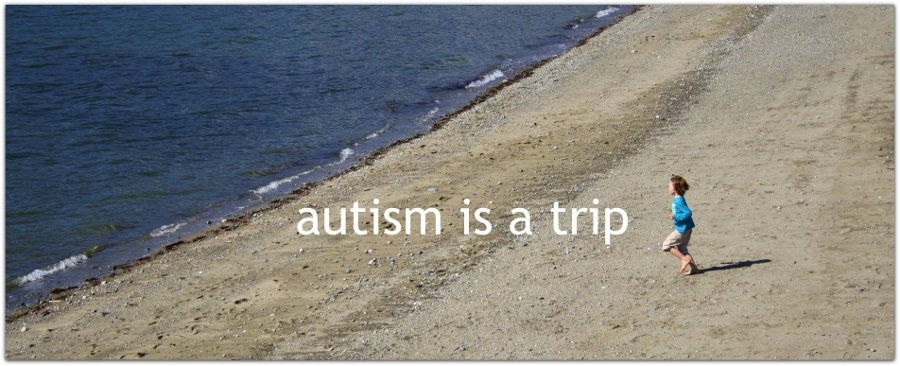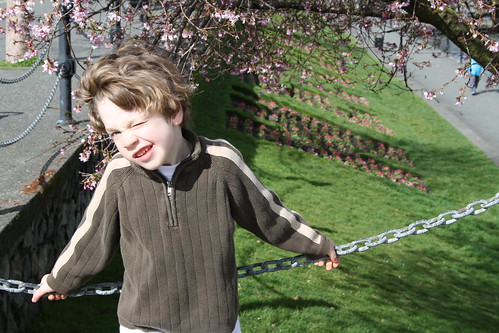Jack came into this world with all the drama one would expect from the son and grandson of actors. My water broke at 29 weeks, and I was in the hospital for 5 1/2 weeks until he was induced. Jack was born 6 weeks early, at 5 pounds, 5 ounces and 20 1/4″. I took my tiny boy home and prepared for a life of mommyhood, something I’d waited for my entire life.
It wasn’t immediately apparent that there was something “wrong” with my child. He was a normal baby, by all measures. He maintained eye contact, he didn’t shy away from touch, and as he grew, he became an affectionate, loving child. He had an abundance of energy, which I chalked up to being a boy. My younger brother is a thrill-seeker, and I figured it ran in the family (which, after having three more boys, I can assure you it does).
The first real indicator that we should be concerned came around 18-20 months, when Jack was still only saying a few words. In fact, some words that he had no problem with a few months prior had completely vanished from his repertoire. By age two, he only had four words. Of course, in retrospect, there were signs all along. Jack always had troubles sleeping. He was easily agitated, and eventually started to vomit at will at bedtime. He was never very attached to any toys or belongings. He also didn’t seem to play “correctly” with his toys unless he was first shown how. He didn’t appear to have any sense of fear or danger. Not in a thrill-seeking way; more like he didn’t even understand the concept. He played alone for long periods of time, but not in an isolating fashion. We just thought he was well-adjusted and enjoyed solitude. Who doesn’t on occasion?
Family members familiar with the Early Intervention program urged us to have him assessed, as did other concerned individuals. Thinking we were only dealing with a speech issue, we obliged.
We contacted the local regional center and had a phone interview. From there, they sent a case worker to our home to assess him further. She came, asked some questions, and set up some more assessments. I realize now, had we had a “typically adjusting” child first, where these questions were leading. We often say had Lennon or Kieran been born first we would have known much earlier that something was “up” with Jack. We didn’t know that toddlers learn body parts and sounds and words and imaginative play so young. We didn’t realize that communicating with a baby could be so easy – we had always been able to read Jack’s cues. I’m still kicking myself for not teaching him to sign early on. I have a lot of “what if’s” I can beat myself up with if I’m in the right mood.
After the social worker came the Occupational Therapist, then the Speech Therapist. When all was said and done, we were hoping to end up with some free speech therapy. What we were offered was amazing – Occupational Therapy twice a week, Speech Therapy twice a week at home, and preschool 5 days a week, all free. I don’t personally think children should be scheduled within an inch of their lives, and I don’t think 2 and 3-year-olds need to be in full-time preschool unless it’s necessary. Still, they seemed to know something we didn’t, so we went ahead with 2 hours of OT, 2 hours of home-based ST, and 3 days of 3-hour preschool at an awesome school with a mix of “special needs” and typically adjusting kids.
Jack responded drastically and immediately to his services. Within a month he had added a ton of words and was signing (he dropped the signing as soon as he could use the proper words). He never had “baby talk” – he sort of skipped that and went straight for the gold, so to speak. He thrived in preschool and really enjoyed his OT.
When the first reports came back to us, we were astounded and more than a little taken aback. Apparently, Jack had poor sensory integration and low upper-body strength. We had been told that OT helped him with his speech issues, but we never dreamed he needed it for other reasons. As the year wore on, these issues seemed to intensify.
We were nearing his 3rd birthday, which is the magical cutoff point for Early Intervention. At the age of three, at least in California, the school system takes over from the regional center in provision of services.
As a part of their exit process, the regional center gave Jack a psychological exam. The doctor was impressed with him, and said he tested on the level of a five-year-old. He also said Jack displayed some “indicators” of autism, but that he didn’t feel “comfortable” with giving him a diagnosis, and that he’d be open to re-assessing him again in six months. At this point I felt some relief, not realizing the gaffe he’d just made. All I knew was I had a super-intelligent little boy (of course) and he was going to be just fine.
I was concerned, however, that Jack wasn’t responding quickly enough to his OT and we’d be left to our own devices after his birthday. His speech was magical and amazing by that point, and he’s ridiculously verbal now. This is thanks to no small effort on the part of the amazing Miss Amanda, Jack’s speech therapist extraordinaire, who also served as our guide through the quagmire of Early Intervention and navigating the school system’s Individual Education Program (IEP) process. She helped me realize that an autism diagnosis isn’t the worst thing in the world, and that maybe if he got one, he’d benefit from the extra time with services.
I was convinced, if it meant more help for my child. I personally don’t care a whit – call him autistic. Call him a purple giraffe if that means he can continue to get the guidance he needs to be the best version of himself possible.
Those of us with children “in the system” know that an autism diagnosis is like a magical key to the kingdom. That “aut” on the IEP means services, help and guidance are there for the taking (yes, there are continued fights for funding and extended services, but at this point it’s still a fantasy world of rainbows and unicorns – at least it was for us). It also means that the regional center will continue services through age 18 if necessary.
I took Jack in for his first IEP assessment with the school district, hoping for an autism diagnosis, but not expecting one. Jack was assessed by an OT, a Speech Therapist and a psychologist. About halfway through, the psychologist sat me down and handed me an autism assessment survey. I was tickled – Jack had “fooled” them (of course, I made sure he was sleepy – the surest way to bring out the worst in him). She walked me through it, making sure to point out the things he was doing and behaviors he had exhibited since his arrival. It didn’t take long for me to see it. Autism. The thing I had feared, the thing I had hoped for, if only in name. There it was. In front of me, in my child. My first born, my beautiful baby boy. All of his quirks and eccentricities, all of his energies and intelligence… all indicators of mild, high-functioning autism.
The rest of the meeting is kind of a blur. The professionals were amazing, something I had not anticipated. I had been warned of the big, bad, scary school district people who would bully me into believing my child was fine and didn’t need their state-funded help. I had been told they would be rude, dismissive and uncaring. They were the absolute opposite. Maybe it’s because I was seven months pregnant with my 3rd child, maybe it’s because they are kind, compassionate people who really want to help my child be his best self.
They explained my options, the way services are handled on the school level, and the different kinds of classrooms he could attend. We all agreed he needed to be in a class with typically adjusting peers and not solely special needs children. He has a thirst for learning and a really sharp mind, he just has a problem with the social end of things. I left with a feeling that everything was going to be ok, that we had gotten everything we had asked for.
Everything. Including an autism diagnosis.
That sunk in on the way home. The realization that my baby had something I couldn’t control hit me like a ton of bricks. I took to my bed for a few days and just tried to process it. I knew everything would be fine, and nothing had actually changed but the designation on a piece of paper, but it hurt nonetheless. My baby. My child. Was it something I did? Something I didn’t do? The most cruel thing about autism is we may never know what causes it or where it comes from. I will always wonder if the drugs I took in the hospital for the back pain from being on bedrest caused this. Or the strain of him being born too soon or my stress level during pregnancy. Like I said, I can self-flagellate with the best of them if necessary.
Once the school system had diagnosed him officially, the regional center gave him another psychological exam. With this doctor, it was an apparent no-brainer. She was shocked the previous doctor had let him slip through the cracks.
Jack entered “big boy” preschool just after his 3rd birthday. He was in a 3-hour a day, 5-day a week program in a collaborative classroom mixed with typically adjusting children for two years. He had a BII, or behavior interventionist, who stayed with him the entire time to keep him on track and help him cope with the day-to-day stresses of the classroom. He had clinic-based OT one hour a week (which was phased out at the end of the last school year), and a half-hour of school-based OT. He received an hour of school-based ST as well. In addition, because of his magical “aut,” he received home-based Behavioral Therapy (ABA) 8 hours a week.
Jack graduated preschool, and we enrolled him in kindergarten in the Vancouver suburb where we now live. He is now in Grade Three, in the fourth year of the French Immersion program, which means his teachers speak only French to him in the classroom. He has a SEA (like the BI he had in preschool) by his side all day to help him focus on his schoolwork and to work on social interactions. Jack adores his new home and his new school, and is not only learning French but teaching his brothers, as well.
Jack is not the same child who began this journey over six years ago. He has responded enthusiastically and amazingly to every challenge and every hurdle. He still has his “issues,” and I’m sure he’ll continue to have them… but he is an amazing child who laughs and loves and gives the biggest and sweetest hugs I could ever ask for. Autism has made his life more challenging, but it’s also made it more exciting. It doesn’t define him, rather, it gives him character.
My child has autism. It does not have him. Autism is a part of the family, and like any other member, it’s going to get made fun of.
*** Wendy
Share this: Twitter | StumbleUpon | Facebook | digg | reddit | eMail









